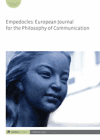
Empedocles-European Journal for the Philosophy of Communication
Scope & Guideline
Engaging Minds in the Philosophy of Communication
Introduction
Aims and Scopes
- Philosophical Foundations of Communication:
The journal explores the philosophical underpinnings of communication, examining how concepts from figures like Augustine and Wittgenstein inform our understanding of communicative practices. - Ethics and Communication:
A consistent focus on ethical dimensions in communication practices, particularly in relation to democracy, disinformation, and the responsibilities of communicators. - Community and Identity:
The journal addresses issues of community, identity, and multiculturalism, analyzing how these concepts are shaped through communicative acts and cultural narratives. - Critical Discourse Analysis:
Employing critical discourse analysis, the journal investigates the implications of language and representation in various media, including film and television, and their societal impacts. - Impact of Technology on Communication:
The journal critically engages with the influence of technology on communication practices, exploring themes such as technocratic solutionism and the dynamics of trust in the information age.
Trending and Emerging
- Disinformation and Democracy:
A significant trend towards exploring the relationship between communication, disinformation, and the protection of democratic values, highlighting the journal's responsiveness to current global challenges. - Embodiment and Ethical Communication:
An increasing focus on embodiment and ethical considerations in communication practices, suggesting a deeper inquiry into how human experiences and suffering shape communicative interactions. - Precarity and Community Dynamics:
Emerging discussions around precarity and its impact on community dynamics and narratives reflect a growing interest in how socio-economic factors influence communication and identity. - Geopolitical Contexts in Communication:
A trend towards examining the geopolitical implications of communication practices, as seen in analyses of discourse and community in contemporary contexts, indicates a broader engagement with global issues. - Interdisciplinary Approaches to Communication:
The journal is increasingly embracing interdisciplinary methodologies, incorporating insights from various fields, including cultural studies, ethics, and political ecology, to enrich the discourse on communication.
Declining or Waning
- Historical Studies in Communication:
There has been a noticeable decline in papers focusing on historical perspectives of communication, such as Peircean studies or discussions centered on historical figures, indicating a shift towards more contemporary issues. - Celebrity Culture Analysis:
The exploration of celebrity culture, as seen in earlier publications, has decreased, suggesting a waning interest in this area compared to more pressing ethical and democratic concerns. - The Role of Orality and Imagery:
Themes surrounding orality and imagery, while once prevalent, have become less frequent, indicating a potential shift towards more abstract or theoretical discussions in communication.
Similar Journals

Global Philosophy
Exploring the Boundaries of Thought Across CulturesGlobal Philosophy, published by Springer, is a pioneering academic journal aimed at advancing the interdisciplinary dialogue within the field of philosophy on a global scale. With its dedicated ISSN 2948-1538 and E-ISSN 2948-152X, this journal provides a valuable platform for researchers and scholars to explore diverse philosophical traditions and contemporary issues affecting our interconnected world. As an Open Access publication, Global Philosophy ensures that cutting-edge research is readily accessible to a wide audience, fostering collaboration and innovation across disciplines. The journal encourages contributions that address both theoretical and practical implications of global philosophical inquiries, making it an essential resource for academics, professionals, and students committed to understanding the complexities of human thought in a global context. Engage with Global Philosophy and contribute to the evolving conversation on the myriad influences of global perspectives in philosophy.

Pensando-Revista de Filosofia
Fostering Innovative Ideas in PhilosophyPensando-Revista de Filosofia, an esteemed publication by UNIV FEDERAL PIAUI, EDITORA, serves as a vibrant platform for philosophical discourse and exploration, anchoring its significance within the field of philosophy. With the ISSN 2178-843X, this journal aims to promote critical thinking and disseminate innovative ideas that advance the study of philosophical theories, contemporary issues, and interdisciplinary approaches. Although it currently operates under non-open access terms, researchers and scholars can look forward to insightful articles that contribute to enriching the philosophical landscape. The journal is nestled in Bom Jesus, Piauí, Brazil, and welcomes submissions that engage with both traditional philosophical frameworks and contemporary dilemmas, encouraging a diverse array of perspectives. With a commitment to academic rigor and an aim to inspire both professionals and students alike, Pensando stands as a crucial resource for anyone eager to deepen their understanding of philosophy and its relevance in today's world.

PHILOSOPHICAL STUDIES
Pioneering Perspectives in Academic PhilosophyPhilosophical Studies, published by Springer, is a prestigious peer-reviewed journal that stands at the forefront of philosophical discourse since its inception in 1950. With ISSN 0031-8116 and E-ISSN 1573-0883, this journal has firmly established itself as a critical platform for disseminating high-quality research in philosophy, positioned in the Q1 category for Philosophy with an impressive Scopus rank of #73 out of 806, placing it in the 90th percentile of its field. Although it does not offer Open Access, the journal’s rigorous selection process ensures that only the most relevant and impactful studies are published, making it an invaluable resource for philosophers, academics, and students alike. With a commitment to advancing philosophical inquiry and fostering a vibrant scholarly community, Philosophical Studies continues to attract contributions that challenge prevailing paradigms and explore new dimensions in philosophical thought. The journal's scope encompasses a wide array of topics within philosophy, encouraging interdisciplinary engagement and dialogue.

Filosofiya-Philosophy
Challenging Perspectives, Inspiring DialogueWelcome to Filosofiya-Philosophy, an esteemed academic journal dedicated to advancing the field of philosophical inquiry. Published by NATSIONALNO IZDATELSTVO AZ BUKI, this journal aims to foster scholarly exchange and promote critical discussions on various philosophical themes and issues, including but not limited to metaphysics, ethics, logic, and epistemology. With its commitment to rigorous research and thought-provoking analyses, Filosofiya-Philosophy seeks to engage researchers, professionals, and students alike, enriching the discourse surrounding philosophical studies. Although currently not an open-access journal, it provides valuable insights that are crucial for the continuous exploration of philosophical ideas. Based in Sofia, Bulgaria, it plays a vital role in the dissemination of philosophical knowledge, inviting submissions from around the globe to enhance its academic community and further its impact in the realm of philosophy.
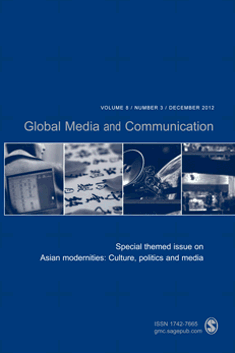
Global Media and Communication
Illuminating the Complex Ties Between Media and CultureGlobal Media and Communication is a premier journal dedicated to advancing the fields of media and communication studies, published by SAGE Publications Ltd. With an ISSN of 1742-7665 and an E-ISSN of 1742-7673, this journal offers a platform for scholarly discourse and innovative research that explores the intricate relationships between global media practices and communication strategies. Recognized as a Q1 journal in both the Arts and Humanities (Miscellaneous) and Communication categories for 2023, it stands out in its commitment to delivering high-quality, peer-reviewed articles that contribute to the understanding of contemporary media landscapes. Located in London, United Kingdom, the journal benefits from being at the heart of cultural and digital innovation. Researchers, professionals, and students can look forward to insightful articles that not only critique existing frameworks but also propose new methodologies, ensuring that Global Media and Communication remains a vital resource for anyone interested in navigating the evolving dynamics of media and communication on a global scale.

Think-Philosophy for Everyone
Exploring Philosophy for Every MindThink-Philosophy for Everyone, published by Cambridge University Press, is a dynamic platform that encourages interdisciplinary dialogue in the realm of philosophy, catering to both seasoned scholars and enthusiastic students alike. With an ISSN of 1477-1756 and an E-ISSN of 1755-1196, this journal encompasses a broad scope from 2019 to 2024, promoting accessible and innovative discussions on philosophical themes relevant to contemporary society. Positioned in the 38th percentile among its peers in the Arts and Humanities category, it ranks #496 out of 806 in Scopus, highlighting its significance within the academic community. Although currently not an Open Access journal, it remains a valuable resource for various academic inquiries. By fostering critical thinking and diverse perspectives, Think-Philosophy for Everyone stands as an essential contribution to the field, inviting researchers and practitioners to explore, challenge, and expand their philosophical horizons.
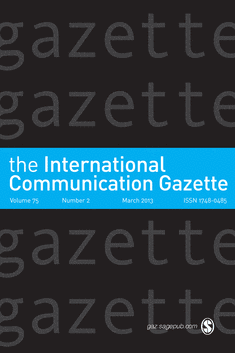
International Communication Gazette
Connecting Sociology and Political Science Through CommunicationThe International Communication Gazette is a prestigious academic journal published by SAGE Publications Inc. that has been at the forefront of communication studies since its inception in 1961. With a focus on interdisciplinary research, this journal aims to explore the ever-evolving landscape of communication within the contexts of sociology and political science. Ranking in the top quartile (Q1) in both the Communication and Sociology & Political Science fields, it offers significant insights into current trends and theories, making it a vital resource for researchers, professionals, and students alike. The journal holds a commendable position in Scopus rankings, standing at #82 out of 511 in Communication and #245 out of 1466 in Sociology and Political Science, reflecting its impact and relevance in the scholarly community. Although it is not an open-access journal, the International Communication Gazette remains committed to disseminating high-quality, peer-reviewed research that sparks discussions and furthers understanding in the dynamic world of global communication.
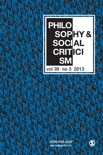
PHILOSOPHY & SOCIAL CRITICISM
Challenging Norms, Inspiring Thought.PHILOSOPHY & SOCIAL CRITICISM, published by SAGE Publications Inc, stands as a pivotal platform for high-quality scholarly discourse, bridging the realms of philosophy and social theory. Since its inception in 1973, this esteemed journal has evolved to encompass provocative analyses and critical examinations of social issues, thereby playing an influential role in shaping contemporary philosophical thought. With an impressive Q1 ranking in the field of philosophy and a Q2 ranking in sociology and political science for 2023, it attracts contributions from leading academics and thought leaders. The journal, which spans topics of significance from the philosophies of ethics to the socio-political landscapes of modernity, provides crucial insights that inform both research and practical applications. Although currently not an open access journal, it offers robust access options through institutional subscriptions, ensuring its wide availability within the academic community. By engaging with the interdisciplinary dialogue fostered in its pages, researchers, professionals, and students alike can benefit from the rich academic exchange that PHILOSOPHY & SOCIAL CRITICISM facilitates, solidifying its importance in the scholarly landscape.
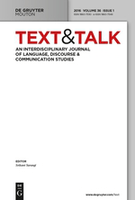
Text & Talk
Connecting Ideas, Cultures, and Perspectives Through TextText & Talk, published by DE GRUYTER MOUTON, is a premier academic journal that serves as a pivotal platform for interdisciplinary scholarship in the fields of Communication, Linguistics, and Philosophy. With its ISSN 1860-7330 and E-ISSN 1860-7349, this Germany-based journal has established a robust presence since its inception in 2005, continuing through 2024. Currently ranked in the Q1 category for both Linguistics and Philosophy, and Q2 in Communication, Text & Talk demonstrates a significant impact within the scholarly community, as reflected in its impressive Scopus rankings across various disciplines. The focus of the journal is to foster rigorous discussions and innovative research on the multifaceted nature of spoken and written discourse, making it indispensable for researchers, professionals, and students eager to explore the interplay between language, context, and communication practices. As an open access title, it enhances visibility and accessibility to cutting-edge research, further solidifying its role as a vital resource in the academic landscape.

Cinemas
Advancing Critical Discourse in Cinematic StudiesCinemas is a leading academic journal dedicated to the exploration and critical analysis of cinematic studies, visual arts, and the dynamic interplay of communication within these fields. Published by Université de Montréal's Program in Bioethics in Canada, this journal serves as a vital platform for researchers, professionals, and students interested in the multifaceted dimensions of cinema and its cultural ramifications. Despite its current positioning in the Q4 quartile of both the Communication and Visual Arts and Performing Arts categories, Cinemas is committed to fostering innovative discourse and scholarship, as evidenced by its inclusion in indexed databases such as Scopus. Covering a range of topics from theoretical frameworks to practical applications within the arts, the journal aims to bridge the gap between academia and the vibrant world of visual storytelling. With a focus on open access, although currently not provided, Cinemas aspires to increase the accessibility of its research to a broader audience, encouraging a rich dialogue that is instrumental to the evolving landscape of cinematic studies.